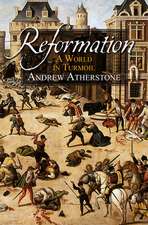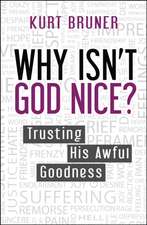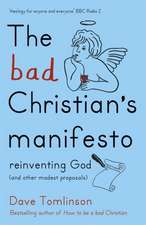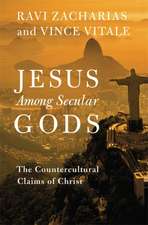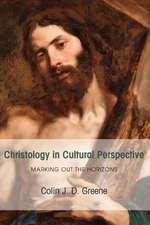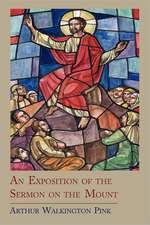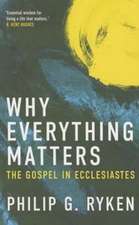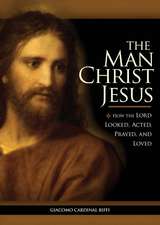God: A Biography
Autor Jack Milesen Limba Engleză Paperback – 29 feb 1996
Vezi toate premiile Carte premiată
Pulitzer Prize (1996)
Preț: 105.81 lei
Nou
Puncte Express: 159
Preț estimativ în valută:
20.25€ • 22.01$ • 17.02£
20.25€ • 22.01$ • 17.02£
Carte disponibilă
Livrare economică 31 martie-14 aprilie
Preluare comenzi: 021 569.72.76
Specificații
ISBN-13: 9780679743682
ISBN-10: 0679743685
Pagini: 464
Dimensiuni: 132 x 206 x 31 mm
Greutate: 0.35 kg
Ediția:Vintage Books.
Editura: Vintage Publishing
ISBN-10: 0679743685
Pagini: 464
Dimensiuni: 132 x 206 x 31 mm
Greutate: 0.35 kg
Ediția:Vintage Books.
Editura: Vintage Publishing
Extras
1
PRELUDE
Can God's Life Be Written?
Can a literary character be said to live a life from birth to death or otherwise to undergo a development from beginning to end? Or is a literary character-fixed on the pages of a book, trapped forever in the same few words and actions-the very opposite of a living, developing human being?
Contention on this point has shaped a century of Hamlet criticism, according to a recent survey by William Kerrigan, who calls the two contending groups the critics and the scholars. The critics, he says, dominant at the start of the century, believed in character. They believed that to talk about Hamlet the play, you had to talk about Hamlet the man: what he said, what he did, and how he changed during the time between his first and his last words onstage. The scholars, dominant in the middle of the century, took as their motto Hamlet's own line "The play's the thing." They believed that, empirically speaking, there was no Hamlet, only Shakespeare's words on the page, and that therefore one could legitimately talk only about them. If one went beyond them, it could not be into the imagined rest of Hamlet, for the rest was silence, to borrow another line from the play. One could go only into the rest of Elizabethan drama and Elizabethan society, seeking other plays that Shakespeare might have known, deepening one's knowledge of the language he spoke, and so forth.
The dean of the critics was A. C. Bradley, whose still influential Shakespearean Tragedy was published in 1904. The turning point from criticism to scholarship and from character to dramaturgy as a focus may be dated to 1933, when L. C. Knights wrote a famous essay, "How Many Children Had Lady Macbeth?" mocking Bradley's assumption-naive in Knights's view-that literary character could ever be talked about in its own right. Knights believed that Bradley's approach was perhaps appropriate for biography but certainly inappropriate for literary criticism.
For decades, Kerrigan shows, the triumph of scholarship over criticism seemed complete. Most of those now teaching and writing about Shakespeare were trained by scholars. Yet criticism never quite folded its tent, and in the last years of the century an interesting bifurcation has occurred.
On the one hand, the kind of historicism whose rise may be dated to Knights's essay has been succeeded by a "New Historicism" with intellectual debts to French thought. Broadly, where the Old Historicism sought to understand the history that was embedded in the text of the play, the New Historicism seeks to understand the play as itself embedded in history. Thus, Kerrigan writes:
Stephen Greenblatt [the best-known of the New Historicists] famously concludes his Renaissance Self-fashioning with the declaration that he had started to write a book on Renaissance individuals but discovered in the end that there are no individuals. One is somewhat amazed to learn at the beginning of his Shakespearean Negotiations that he started this book, too, in a quest for the writer's unique intensity but discovered in the end that there are no writers: "This book argues that works of art, however intensely marked by the creative intelligence and private obsession of individuals, are the products of collective negotiation and exchange.";
The reign of scholarship continues, therefore; yet, on the other hand, at least a few erstwhile scholars are surreptitiously defecting to criticism, among them Kerrigan himself. "I was trained by scholars," he writes, "and speaking of 'character development' in Hamlet makes me uneasy. But I do not know how else to describe the shift from the self-loathing Hamlet of the final two soliloquies to the beautifully calm Hamlet of Act 5." Philosophically, Bradley was a Hegelian, and the struggle between him and Knights was a literary version of the long-running contest between German (or Continental) idealism and British empiricism. But both traditions trace, ultimately, to classical antiquity, and Kerrigan ends his survey with Aristotle:
So we need to understand Hamlet's beginning and his end, and need to put them together. Modern Aristotles puzzling out the mysterious tragedy of character, we must connect beginning, middle, and end.
That's the way it's done.
THE BIOGRAPHY OF GOD
That is the way it will be done in this book. I have begun this foreword with a discussion of Hamlet because I want to situate my subject in literature. I write here about the life of the Lord God as-and only as-the protagonist of a classic of world literature; namely, the Hebrew Bible or Old Testament. I do not write about (though I certainly do not write against) the Lord God as the object of religious belief. I do not attempt, as theology does, to make an original statement about God as an extraliterary reality. I do not write as a historian and therefore do not focus, as historians do, on the successive Israelite and Jewish communities that believed in God. My interest goes not to those believing communities but, after the fashion of A. C. Bradley, to the God they believed in. And I believe with Bradley, and against Knights, that the biographical effect-the artistic suggestion of a life-is inseparable from the dramatic or literary effect itself. Unless the viewer of Hamlet can believe that Hamlet was born and will die, unless the viewer's imagination is carried offstage into the life for which there is no direct evidence onstage, the play dies with its protagonist. A character understood to have no life offstage can have no life onstage. And so it is also with God as the protagonist of the Bible.
If biography is seen narrowly as a branch of history, then there can be no biography of a nonhistorical character. But God does have a first and a last appearance in the Hebrew Bible. We see him first as the creator, outside history, prior to it, masterfully setting in motion the heavenly bodies by which historical time will be measured, We see him last as the "Ancient of Days," white-haired and silent, looking forward to the end of history from a remote and cloudy throne. This book becomes a biography of a special sort by dint of its determination to describe the middle that lies between so vigorous a beginning and so quiescent an end.
The beginning and the end of the Hebrew Bible are not linked by a single, continuous narrative. Well short of the halfway point in the text, the narrative breaks off. What then follow are, first, speeches spoken by God; second, speeches spoken either to or, in some degree, about God; third, a protracted silence; and, last, a brief resumption of the narrative before a closing coda. The narrative suspense that lasts from the Book of Genesis through II Kings is succeeded, past that point, by another kind of suspense, one more like the kind jurors experience in a courtroom as different witnesses take the stand to talk about the same person. A sequence of testimonies-each in its own distinctive voice, with its own beginning and end-can be as effective as narrative in suggesting that the person about whom the words are spoken does not stop where the words stop. This is the biographical effect in another form. And even in this form, it is an effect that can include a sense of forward movement, of "What next?"
After action yields to speech in the Hebrew Bible, however, speech yields in its turn to silence. God's last words are those he speaks to Job, the human being who dares to challenge not his physical power but his moral authority. Within the Book of Job itself, God's climactic and overwhelming reply seems to silence Job. But reading from the end of the Book of Job onward, we see that it is Job who has somehow silenced God. God never speaks again, and he is decreasingly spoken of. In the Book of Esther-a book in which, as in the Book of Exodus, his chosen people faces a genocidal enemy-he is never so much as mentioned. In effect, the Jews surmount the threat without his help.
What is the meaning of the long twilight of the Hebrew Bible, its ten closing books of silence? The twilight is not followed by darkness: God does not die. But he never again intervenes in human affairs, and by accumulating implication, no further intervention is expected of him. His chosen people, returned from exile, cherishes him more than ever as his life ends-more, certainly, than when he vanquished Pharaoh "with mighty hand and outstretched arm" and led them through the desert to the promised land. Back then, they were recalcitrant, and he called them, bitterly, "stiff-necked." Now they are devout, but he has nothing further to say to them or about them-or to or about anybody or anything else. God and his people are beautifully, movingly reconciled as the Hebrew Bible ends, but it scarcely seems blasphemy to say that his own life is over.
This broad movement from action to speech to silence yields an account that might be called theography, as distinct from either theology or biography. A medieval mystic once wrote, "God cancels the successiveness of men," meaning that while human beings experience their lives one day at a time, God sees their lives' time as a portrait on a wall, every moment visible to him at once. But human beings have returned the favor with a vengeance, canceling the successiveness of the protagonist of the Bible by a tradition of Bible reading that regards the entirety of the text as simultaneous to itself, so that any verse may be read as the commentary on any other verse and any statement true of God at one point is taken to be true of God at all points.
"Jesus Christ is the same yesterday and today and for ever," the New Testament reads at Hebrews 13:8; but that one late and questionable verse aside, there is virtually no warrant in the New Testament for any claim that God is immutable, and there is equally little in the Hebrew Bible. The origin of this view lies presumably in Aristotelian philosophy, with its view of God as the unmoved mover, existing in a single, eternal moment. True, the Lord God of Israel is the creator and ruler of time, and the Psalms delight in repeating that he lives forever. To that extent he is like Aristotle's unmoved mover. And yet, contradictory as this must seem, he also enters time and is changed by experience. Were it not so, he could not be surprised; and he is endlessly and often most unpleasantly surprised. God is constant; he is not immutable.
A strictly sequential reading of the Hebrew Bible is a way to recover the successiveness, the character development or theography, that "Aristotelian" exegesis has obscured. Thus, Christians pray "Our Father, who art in heaven . . . " as Christ did, and imagine that the being who says, at Genesis 1:3, "Let there be light" is a father, but God does not refer to himself as a father at that point. Only several hundred pages later, in II Samuel 7, does he do this for the first time. Jews pray "Blessed art thou, O Lord, our God, King of the Universe"; and imagine that the God of Genesis is a king, but he does not present himself as a king until even later, at Isaiah 6. "Later" in this context does not mean later in historical time but simply later in the exposition, further along in a start-to-finish reading of the book. Historically speaking, the "time" when God says "Let there be light" lies outside time; but from the point of view of a reader beginning at the beginning of the Book of Genesis and reading straight on from there, we may still speak of "later" and "earlier." In this book, we often shall.
There is no pretending that a diachronic or straight-through reading of the Hebrew Bible is the only possible approach to the character of God as its protagonist. A synchronic reading is also possible. That is, instead of proceeding from beginning to end in quasi-chronological order, a critic may create a set of topical headings and gather under each all the texts that seem to belong there. But a self-consciously naive, start-to-finish approach, besides being more respectful of the integrity of the Bible as a work of literature, has, as we shall see, a surprising drama and pathos about it.
Because this is a literary rather than a historical study, deliberate na?vet? of another sort becomes possible and indeed necessary. Critical historians of any period or subject are at pains to distinguish what really happened from what did not happen. Even when they are quite certain that they are dealing with a literary invention, their concern is not to appreciate the invention in itself as a work of literary art but to recover from it evidence about some real history, if only the intellectual history of its author. Myth, legend, and history mix endlessly in the Bible, and Bible historians are endlessly sorting them out. Literary criticism, however, not only can but must leave them mixed. The Book of Genesis says that God turned Lot's wife into a pillar of salt, an event that obviously has no status as history but one that for the purposes of this work must be counted as a moment in the life of God and as evidence, however minor, about his developing character. We may allow the historians to tell us what really happened. We may allow the theologians to tell us whether the real God would ever do a thing like that. For literary purposes, however, which are the only purposes of this book, the fact that the protagonist of the book does indeed perform this action on its pages is enough to bring it into the reckoning.
Skeptical readers may ask, of course, whether there is not, even in a secular era, something misbegotten about an attempt to understand God in terms so like those we use to understand human beings. Robert Alter writes in this vein:
There is little to be gained, I think, by conceiving of the biblical God, as Harold Bloom does, as a human character-petulant, headstrong, arbitrary, impulsive, or whatever. The repeated point of the biblical writers is that we cannot make sense of God in human terms.
But Alter exaggerates. One of the very earliest statements any biblical writer makes about God is that mankind, male and female, is God's image-an unmistakable invitation to make some sense of God in human terms. God rarely says of himself that he is mysterious and more than once implies the opposite, as when, speaking of whether his words are difficult to understand, he says:
Surely, this Instruction which I enjoin upon you this day is not too baffling for you, nor is it beyond reach. It is not in the heavens, that you should say, "Who among us can go up to the heavens and get it for us and impart it to us, that we may observe it?" (Deut. 30:11-12)
PRELUDE
Can God's Life Be Written?
Can a literary character be said to live a life from birth to death or otherwise to undergo a development from beginning to end? Or is a literary character-fixed on the pages of a book, trapped forever in the same few words and actions-the very opposite of a living, developing human being?
Contention on this point has shaped a century of Hamlet criticism, according to a recent survey by William Kerrigan, who calls the two contending groups the critics and the scholars. The critics, he says, dominant at the start of the century, believed in character. They believed that to talk about Hamlet the play, you had to talk about Hamlet the man: what he said, what he did, and how he changed during the time between his first and his last words onstage. The scholars, dominant in the middle of the century, took as their motto Hamlet's own line "The play's the thing." They believed that, empirically speaking, there was no Hamlet, only Shakespeare's words on the page, and that therefore one could legitimately talk only about them. If one went beyond them, it could not be into the imagined rest of Hamlet, for the rest was silence, to borrow another line from the play. One could go only into the rest of Elizabethan drama and Elizabethan society, seeking other plays that Shakespeare might have known, deepening one's knowledge of the language he spoke, and so forth.
The dean of the critics was A. C. Bradley, whose still influential Shakespearean Tragedy was published in 1904. The turning point from criticism to scholarship and from character to dramaturgy as a focus may be dated to 1933, when L. C. Knights wrote a famous essay, "How Many Children Had Lady Macbeth?" mocking Bradley's assumption-naive in Knights's view-that literary character could ever be talked about in its own right. Knights believed that Bradley's approach was perhaps appropriate for biography but certainly inappropriate for literary criticism.
For decades, Kerrigan shows, the triumph of scholarship over criticism seemed complete. Most of those now teaching and writing about Shakespeare were trained by scholars. Yet criticism never quite folded its tent, and in the last years of the century an interesting bifurcation has occurred.
On the one hand, the kind of historicism whose rise may be dated to Knights's essay has been succeeded by a "New Historicism" with intellectual debts to French thought. Broadly, where the Old Historicism sought to understand the history that was embedded in the text of the play, the New Historicism seeks to understand the play as itself embedded in history. Thus, Kerrigan writes:
Stephen Greenblatt [the best-known of the New Historicists] famously concludes his Renaissance Self-fashioning with the declaration that he had started to write a book on Renaissance individuals but discovered in the end that there are no individuals. One is somewhat amazed to learn at the beginning of his Shakespearean Negotiations that he started this book, too, in a quest for the writer's unique intensity but discovered in the end that there are no writers: "This book argues that works of art, however intensely marked by the creative intelligence and private obsession of individuals, are the products of collective negotiation and exchange.";
The reign of scholarship continues, therefore; yet, on the other hand, at least a few erstwhile scholars are surreptitiously defecting to criticism, among them Kerrigan himself. "I was trained by scholars," he writes, "and speaking of 'character development' in Hamlet makes me uneasy. But I do not know how else to describe the shift from the self-loathing Hamlet of the final two soliloquies to the beautifully calm Hamlet of Act 5." Philosophically, Bradley was a Hegelian, and the struggle between him and Knights was a literary version of the long-running contest between German (or Continental) idealism and British empiricism. But both traditions trace, ultimately, to classical antiquity, and Kerrigan ends his survey with Aristotle:
So we need to understand Hamlet's beginning and his end, and need to put them together. Modern Aristotles puzzling out the mysterious tragedy of character, we must connect beginning, middle, and end.
That's the way it's done.
THE BIOGRAPHY OF GOD
That is the way it will be done in this book. I have begun this foreword with a discussion of Hamlet because I want to situate my subject in literature. I write here about the life of the Lord God as-and only as-the protagonist of a classic of world literature; namely, the Hebrew Bible or Old Testament. I do not write about (though I certainly do not write against) the Lord God as the object of religious belief. I do not attempt, as theology does, to make an original statement about God as an extraliterary reality. I do not write as a historian and therefore do not focus, as historians do, on the successive Israelite and Jewish communities that believed in God. My interest goes not to those believing communities but, after the fashion of A. C. Bradley, to the God they believed in. And I believe with Bradley, and against Knights, that the biographical effect-the artistic suggestion of a life-is inseparable from the dramatic or literary effect itself. Unless the viewer of Hamlet can believe that Hamlet was born and will die, unless the viewer's imagination is carried offstage into the life for which there is no direct evidence onstage, the play dies with its protagonist. A character understood to have no life offstage can have no life onstage. And so it is also with God as the protagonist of the Bible.
If biography is seen narrowly as a branch of history, then there can be no biography of a nonhistorical character. But God does have a first and a last appearance in the Hebrew Bible. We see him first as the creator, outside history, prior to it, masterfully setting in motion the heavenly bodies by which historical time will be measured, We see him last as the "Ancient of Days," white-haired and silent, looking forward to the end of history from a remote and cloudy throne. This book becomes a biography of a special sort by dint of its determination to describe the middle that lies between so vigorous a beginning and so quiescent an end.
The beginning and the end of the Hebrew Bible are not linked by a single, continuous narrative. Well short of the halfway point in the text, the narrative breaks off. What then follow are, first, speeches spoken by God; second, speeches spoken either to or, in some degree, about God; third, a protracted silence; and, last, a brief resumption of the narrative before a closing coda. The narrative suspense that lasts from the Book of Genesis through II Kings is succeeded, past that point, by another kind of suspense, one more like the kind jurors experience in a courtroom as different witnesses take the stand to talk about the same person. A sequence of testimonies-each in its own distinctive voice, with its own beginning and end-can be as effective as narrative in suggesting that the person about whom the words are spoken does not stop where the words stop. This is the biographical effect in another form. And even in this form, it is an effect that can include a sense of forward movement, of "What next?"
After action yields to speech in the Hebrew Bible, however, speech yields in its turn to silence. God's last words are those he speaks to Job, the human being who dares to challenge not his physical power but his moral authority. Within the Book of Job itself, God's climactic and overwhelming reply seems to silence Job. But reading from the end of the Book of Job onward, we see that it is Job who has somehow silenced God. God never speaks again, and he is decreasingly spoken of. In the Book of Esther-a book in which, as in the Book of Exodus, his chosen people faces a genocidal enemy-he is never so much as mentioned. In effect, the Jews surmount the threat without his help.
What is the meaning of the long twilight of the Hebrew Bible, its ten closing books of silence? The twilight is not followed by darkness: God does not die. But he never again intervenes in human affairs, and by accumulating implication, no further intervention is expected of him. His chosen people, returned from exile, cherishes him more than ever as his life ends-more, certainly, than when he vanquished Pharaoh "with mighty hand and outstretched arm" and led them through the desert to the promised land. Back then, they were recalcitrant, and he called them, bitterly, "stiff-necked." Now they are devout, but he has nothing further to say to them or about them-or to or about anybody or anything else. God and his people are beautifully, movingly reconciled as the Hebrew Bible ends, but it scarcely seems blasphemy to say that his own life is over.
This broad movement from action to speech to silence yields an account that might be called theography, as distinct from either theology or biography. A medieval mystic once wrote, "God cancels the successiveness of men," meaning that while human beings experience their lives one day at a time, God sees their lives' time as a portrait on a wall, every moment visible to him at once. But human beings have returned the favor with a vengeance, canceling the successiveness of the protagonist of the Bible by a tradition of Bible reading that regards the entirety of the text as simultaneous to itself, so that any verse may be read as the commentary on any other verse and any statement true of God at one point is taken to be true of God at all points.
"Jesus Christ is the same yesterday and today and for ever," the New Testament reads at Hebrews 13:8; but that one late and questionable verse aside, there is virtually no warrant in the New Testament for any claim that God is immutable, and there is equally little in the Hebrew Bible. The origin of this view lies presumably in Aristotelian philosophy, with its view of God as the unmoved mover, existing in a single, eternal moment. True, the Lord God of Israel is the creator and ruler of time, and the Psalms delight in repeating that he lives forever. To that extent he is like Aristotle's unmoved mover. And yet, contradictory as this must seem, he also enters time and is changed by experience. Were it not so, he could not be surprised; and he is endlessly and often most unpleasantly surprised. God is constant; he is not immutable.
A strictly sequential reading of the Hebrew Bible is a way to recover the successiveness, the character development or theography, that "Aristotelian" exegesis has obscured. Thus, Christians pray "Our Father, who art in heaven . . . " as Christ did, and imagine that the being who says, at Genesis 1:3, "Let there be light" is a father, but God does not refer to himself as a father at that point. Only several hundred pages later, in II Samuel 7, does he do this for the first time. Jews pray "Blessed art thou, O Lord, our God, King of the Universe"; and imagine that the God of Genesis is a king, but he does not present himself as a king until even later, at Isaiah 6. "Later" in this context does not mean later in historical time but simply later in the exposition, further along in a start-to-finish reading of the book. Historically speaking, the "time" when God says "Let there be light" lies outside time; but from the point of view of a reader beginning at the beginning of the Book of Genesis and reading straight on from there, we may still speak of "later" and "earlier." In this book, we often shall.
There is no pretending that a diachronic or straight-through reading of the Hebrew Bible is the only possible approach to the character of God as its protagonist. A synchronic reading is also possible. That is, instead of proceeding from beginning to end in quasi-chronological order, a critic may create a set of topical headings and gather under each all the texts that seem to belong there. But a self-consciously naive, start-to-finish approach, besides being more respectful of the integrity of the Bible as a work of literature, has, as we shall see, a surprising drama and pathos about it.
Because this is a literary rather than a historical study, deliberate na?vet? of another sort becomes possible and indeed necessary. Critical historians of any period or subject are at pains to distinguish what really happened from what did not happen. Even when they are quite certain that they are dealing with a literary invention, their concern is not to appreciate the invention in itself as a work of literary art but to recover from it evidence about some real history, if only the intellectual history of its author. Myth, legend, and history mix endlessly in the Bible, and Bible historians are endlessly sorting them out. Literary criticism, however, not only can but must leave them mixed. The Book of Genesis says that God turned Lot's wife into a pillar of salt, an event that obviously has no status as history but one that for the purposes of this work must be counted as a moment in the life of God and as evidence, however minor, about his developing character. We may allow the historians to tell us what really happened. We may allow the theologians to tell us whether the real God would ever do a thing like that. For literary purposes, however, which are the only purposes of this book, the fact that the protagonist of the book does indeed perform this action on its pages is enough to bring it into the reckoning.
Skeptical readers may ask, of course, whether there is not, even in a secular era, something misbegotten about an attempt to understand God in terms so like those we use to understand human beings. Robert Alter writes in this vein:
There is little to be gained, I think, by conceiving of the biblical God, as Harold Bloom does, as a human character-petulant, headstrong, arbitrary, impulsive, or whatever. The repeated point of the biblical writers is that we cannot make sense of God in human terms.
But Alter exaggerates. One of the very earliest statements any biblical writer makes about God is that mankind, male and female, is God's image-an unmistakable invitation to make some sense of God in human terms. God rarely says of himself that he is mysterious and more than once implies the opposite, as when, speaking of whether his words are difficult to understand, he says:
Surely, this Instruction which I enjoin upon you this day is not too baffling for you, nor is it beyond reach. It is not in the heavens, that you should say, "Who among us can go up to the heavens and get it for us and impart it to us, that we may observe it?" (Deut. 30:11-12)
Descriere
What sort of "person" is God? Is it possible to approach him not as an object of religious reverence, but as the protagonist of the world's greatest book--as a character who possesses all the depths, contradictions, and abiguities of a Hamlet? In this "brilliant, audacious book" (Chicago Tribune), a former Jesuit marshalls a vast array of learning and knowledge of the Hebrew Bible to illuminate God--and man--with a sense of discovery and wonder.
Notă biografică
Premii
- Pulitzer Prize Winner, 1996


